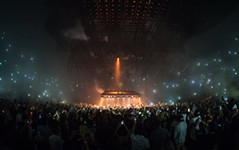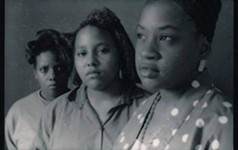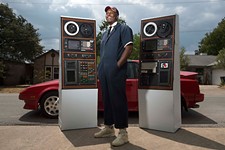Kanye West: Rock Star
“I’m the biggest of all of them”
By Kahron Spearman, 12:15PM, Tue. Jul. 7, 2015
“Rap is the new rock & roll. We the new rock stars, and I’m the biggest of all of them. I’m the No. 1 rock star on the planet,” claimed Kanye West during a 2013 interview with the BBC’s Zane Lowe. Many loaded discussions can be found in those three sentences. But, is Kanye right? Is he, in fact, the world’s greatest rock star? And if he is, what does it signify?

West certainly fits most of the stereotypical aspects of a rock star: (arguably) supremely talented (which isn’t always a requirement anyway), egotistical, prone to epic levels of simultaneous insolence and illusions of grandeur, interminably dramatic, and a nearly unmatched passion for greatness and/or the spotlight – perhaps the same thing for West, and most rock stars. Remove “rapper” from the equation, and you’re looking at an early-Nineties Axl Rose or Liam Gallagher.
The Chicago producer/MC’s assertions arrive compounded by his relationship with race, and rockists’ relationship with rap music (and in turn, race). Violently at odds, West clashes with the supposed normative centering of rock. The problem with this concept is that the definition of “rock” has literally never been solidified.
Always liquid, similarly with rap, rock’s borders remain as blurry as the lower levels of eye charts. Of the central criteria, rap generally employs no instruments, only a backing beat. This is ultimately a mute attack on technology, like classical musicians disliking rock music for its harnessing of electricity.
Even so, times are continually a-changin’ – ch-ch-ch-changin’ – especially with rap’s ascendance to mainstream ubiquity. You can’t sit through a commercial break without hearing some sort of trap production, wherein trance and hip-hop collide. A newish Dodge ad (sub)marines the stolid old guard with Rae Sremmurd’s “No Flex Zone,” bass hits beating down the Downton Abbey blocks.
Glastonbury launched into the present a few years ago, the UK mega festival booking Jay-Z to much consternation. “Purists” like Noel Gallagher, formerly and mainly of Oasis, denounced the addition of the MC as a headliner. A known fan of rock music, the rapper won both the crowd and the optics war, trolling Gallagher with a rendition of “Wonderwall.”
Last month’s Glastonbury headlining turn by West found him utilizing Queen’s “Bohemian Rhapsody” to pull in the crowd toward the end of a middling set. He doubled down on his usual bluster, announcing, “I’m going to say this tonight because 20 years from now, 30 years from now, 40 years from now, I might not be able to say it, but I can say it tonight: You are now watching the greatest living rock star on the planet.”
The Who’s Pete Townshend immediately, and predictably, jumped onto the growing pile. Fan fickleness aside, younger rock acts have either no comment, or maintain an appreciation for West, including Justin Vernon, Win Butler, and Beck. The divide seems to be tied to a constant rebuilding (rehashing, re-whatevering) of the older rock set.
For example, Rush stamps the cover of the Rolling Stone currently on stands. It’s long overdue, but only two covers before, you’ll find the Grateful Dead. On other magazines like Q and NME, you find similar re-elevation of rock stars past, as if they might just fade away otherwise. That’s the problem – “now” could vaporize them.
Rock, even the idea of it, no longer means what it did in 1966, 1976, 1986, or 2006. Rap and processed pop adequately communicate the message for today.
West has been at the spear’s tip of a unique crossover, advanced in its execution through medium and regressive in its message. Jean Baudrillard’s The Gulf War Did Not Take Place argues the Gulf War as an inversive turning point, positing the war as “the continuation of the absence of politics by other means.” For music, replace “politics” with “a message.”
Instead of proper burials and remembrances, older rock acts become dated superheroes being buried in shallow, easily unearthed graves. Kanye West’s ascendance to New Age Bizzaro Superman is indicative of nothing more than socio-cultural change. For which he is the medium.
A note to readers: Bold and uncensored, The Austin Chronicle has been Austin’s independent news source for over 40 years, expressing the community’s political and environmental concerns and supporting its active cultural scene. Now more than ever, we need your support to continue supplying Austin with independent, free press. If real news is important to you, please consider making a donation of $5, $10 or whatever you can afford, to help keep our journalism on stands.
Kevin Curtin, March 13, 2015
Sept. 15, 2023
Sept. 8, 2023
Kanye West, Jay Z, Rae Sremmurd, Glastonbury, Queen, The Who, Pete Townshend, Axl Rose, Liam Gallagher, Noel Gallagher, Oasis, Justin Vernon, Win Butler, Beck, Rush, Grateful Dead, Jean Baudrillard










